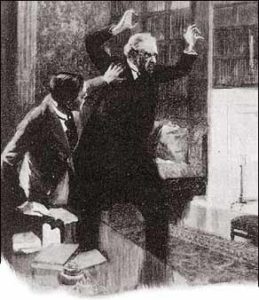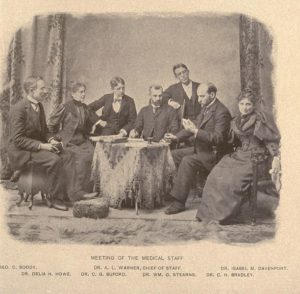
Image from Doyle’s Story, The Creeping Man
Sir Arthur Conan Doyle’s Sherlock Holmes stories illustrate several Victorian ideas about insanity and its causes (see last post). In “The Adventure of the Naval Treaty,” Doyle described a case of acute mania which was resolved with prompt and proper care–an entirely understandable outcome. However, with “The Creeping Man,” Doyle’s understanding of the external causes of human behavior seems to be completely awry.
In this mystery from 1923, Professor Presbury’s personal secretary tells Holmes and Watson about his employer’s peculiar changes in behavior. Holmes eventually discovers the bizarre reason for the professor’s changed behavior: Presbury started to behave like a monkey because in a quest for youth, he began using a serum obtained from monkey blood/glands. This serum has given him the animal’s traits.

Insane Asylum at Kankakee
The idea behind this story sounds ridiculous, but Doyle may have been taking a cue from real events. In 1899, the New York Times had reported on Irwin Fuller Bush, a young man considered hopelessly insane and admitted to the Insane Asylum at Kankakee (Illinois). He had been almost miraculously restored to health by Dr. B. P. Roberts, a physician in Greene City, Missouri who treated Bush with animal glands. Roberts said, “Today, through the treatment with lymph from glands of goats, Bush is at home and declared to be completely restored in mind.”

Meeting of the Medical Staff, Kankakee Mental Hospital, circa 1910
The glands were also said to “arrest senility.” Roberts was enthusiastic enough about his treatment to go to Europe and try to convince alienists there to adopt the treatment in their own insane asylums. This real-life event and others using animal glands to cure various ailments, simply reflected the medical community’s imperfect understanding of what caused physical and mental changes in people.